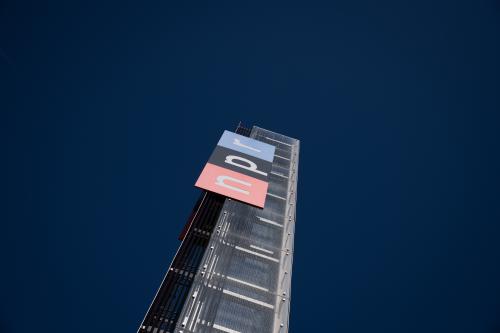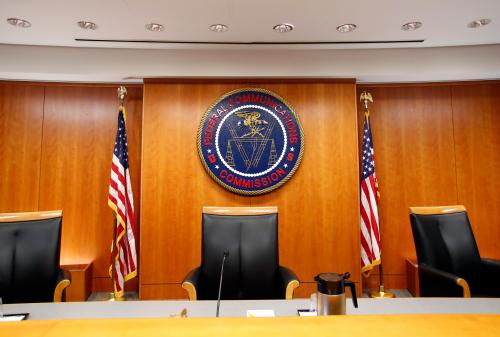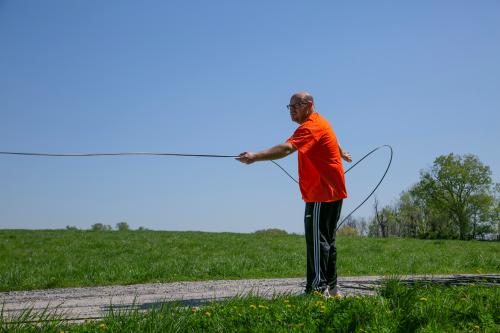The most demanding speech any Chairman of the Federal Communications Commission (FCC) must deliver is the annual address to the National Association of Broadcasters (NAB) convention. The echoes of Chairman Newton Minow’s 1961 “vast wasteland” speech to that organization have haunted every word in every Chair’s script for over six decades. Those of us who followed Newt were only aspirants to his vision of a public interest-driven FCC with the responsibility to challenge those it regulated.
On May 6, 2023, Newton Minow died; his 97 years were ones of continual contributions to his country and our national communications systems.
Nineteen sixty-one, the first year of the Kennedy Administration, was the height of the power of television broadcasters. If a political leader or advertiser wanted to reach America, the path led through the three national networks and their local broadcast outlets. The message Minow delivered challenged those powerhouses to be better.
“When television is good, nothing – not the theater, not the magazines or newspapers – nothing is better,” he told the NAB audience. “But when television is bad, nothing is worse. I invite each of you to sit down in front of your television set when your station goes on the air and stay there, for a day, without a book, without a magazine, without a newspaper, without a profit and loss sheet or rating book to distract you… I can assure you that what you will observe is a vast wasteland.”
It was the first major address for the newly appointed, young (35-year-old) Chairman. Instead of lauding the broadcasters, as was traditional, Minow called them out and challenged their leadership to do better for their viewers. “There is nothing permanent or sacred about a broadcast license,” he told those whose livelihoods depended upon those FCC-issued licenses.
It was a challenge not only to the industry, but also to the agency that some viewed as being too close to those it was supposed to oversee. The year before Minow’s speech, a previous Chairman resigned in scandal after accepting a lavish cruise on the yacht of a broadcast company president. Minow not only challenged the broadcasters, but also challenged his new agency to look beyond accommodating the broadcasters to regulating them in the name of the public interest.
Of course, the broadcasters fought back. The speech was criticized as elitist, unfair, and oversimplified. A new television series Gilligan’s Island—which, it could be argued, fit his “vast wasteland” definition—mocked him by naming the marooned boat at the center of the show’s plot the S.S. Minnow (misspelling Minow’s name with two “n’s”).
Speaking truth to power in such a graceful, articulate, and powerful manner, however, became a part of the regulatory lexicon. Its effect was to change the discussion about broadcasting and raise the vision of government officials.
Newt Minow was only Chairman from 1961 to 1963. His “vast wasteland” speech made him famous, but his advocacy, vision, and leadership were broad and left lasting effects. After reframing the oversight of commercial broadcasting, Minow successfully fought for an increase in the number of public television stations. Then, at a time when public television’s UHF (ultrahigh frequency) airwaves could not be received by standard televisions but required an add-on antenna and tuner, Minow successfully fought to require all television sets to be manufactured with UHF capability, thus establishing parity with commercial broadcasters.
Newt Minow’s vision went far beyond broadcasting. Only three years after the launch of Sputnik, he foresaw satellites being used for communications and advocated for the establishment of an American communications satellite program. The result was the Communications Satellite Act of 1962 and the establishment of the Communications Satellite Corp. (Comsat) as a government entity. Then, when commercial provider Telstar proposed a non-governmental satellite, Minow’s FCC approved the application.
After leaving the FCC, Newt Minow continued to advocate for the public interest. He was a leader in the public broadcasting community and was instrumental in the creation of the presidential campaign debates. As a partner in the Chicago law firm Sidney and Austin, he hired as an intern a young Harvard Law student named Barack Obama. He once whispered to me that it was he who introduced Obama to a young associate in the firm, Michelle Robinson.
It was a privilege to know Newt Minow. I always loved opening my email to find a note from him commenting on one issue or another. He will always be an inspiration for FCC Chairs, including me, both for what he accomplished and for the vision and regulatory initiative he imbued in the agency and challenged us all to follow.







Commentary
National treasure Newton Minow passes
Monday, May 15, 2023